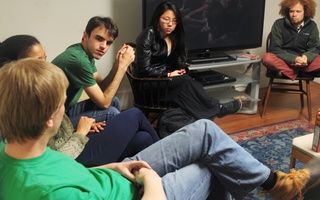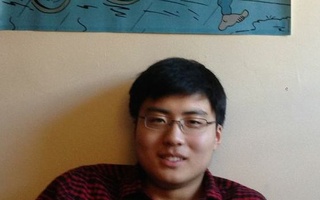{shortcode-dcb2be1f41a21176db0399ac79ae63ad076dafac}
Students filled a Science Center lecture hall Sunday afternoon to discuss matters beyond the study card: the differing ethical principles of Christians and non-believers.
The event, hosted by the student group Harvard Community of Humanists, Agnostics, and Atheists and non-denominational Christian group Harvard College Faith and Action, with co-sponsorship from the Harvard Political Union, was a moderated debate about varying conceptions of the “good life.”
Philosophy Professor Jeffrey K. McDonough helped guide the discussion as students attempted to articulate their different worldviews.
“Are theists alone in thinking that murder is wrong? Are atheists alone in thinking that fish sticks on Friday still aren’t that good?” McDonough asked.
Speaking for HCHAA, Sarah E. Coughlon ’15 said that she found a supportive and diverse community among fellow non-believers at Harvard, despite what she sees as a common belief that atheism lack the structure of many Christian religions. Members of HCHAA in the audience wore matching red shirts, which read “Got Soul? Me neither.”
“There is a strain of thought, especially in the Western thought, of singling out the atheists as ‘the other’ group,” Coughlon said. “There seems to be some sort of thought that religion does something that atheism can’t.”
Members from HCFA and HCHAA disagreed about the extent to which individuals are obligated to help others.
During a question-and-answer portion of the debate, David M. Fulton ’16 of HCFA pointed to a direct example of how another HCFA member continually reached out to a friend who was caught up in using drugs, stealing credit cards, lying, and drunk-driving to highlight the Christian commitment of continually helping others.
Coughlon and fellow HCHAA debater Savannah N. Fritz ’17 said they are committed to the idea of assisting those in need but do not think that individuals are morally obligated to insert themselves in situations that might cause them considerable pain.
Representatives from both groups said that they hoped the event would serve as a catalyst for future conversation.
“Everything that we are saying right now is kind of unsubstantiated,” Fulton said in his closing remarks. “You kind of have to go out and see for yourself.”
Audience members applauded the debate for providing a means of discussion and contact between students of varying religious backgrounds.
“I think that the debate is merely a starting point,” said Karl E. Krehbiel ’15, a member of HCFA, adding that “it generally tends to facilitate friendships.”
“I think that the purpose, for me, is to get the conversation started, to recognize how big the conversation is and how neither side can persuade the other in an hour or two,” Harvard Humanist Chaplain Greg M . Epstein said after the debate.
—Staff writer Theodore R. Delwiche can be reached at theodore.delwiche@thecrimson.com. Follow him on Twitter @trdelwic.
Read more in College News
Dunster Students Praise Renovated Inn
















